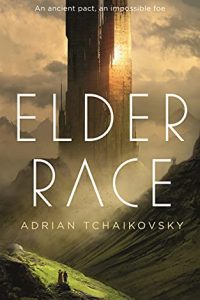T.G Shenoy Reviews The Year’s Best African Speculative Fiction by Oghenechovwe Donald Ekpeki
 The Year’s Best African Speculative Fiction, Oghenechovwe Donald Ekpeki, ed. (Jembefola Press, $6.99, eb) September 2021. Cover by Maria Spada.
The Year’s Best African Speculative Fiction, Oghenechovwe Donald Ekpeki, ed. (Jembefola Press, $6.99, eb) September 2021. Cover by Maria Spada.
Oghenechovwe Donald Ekpeki. You’ll want to remember the name because if the recent past is anything to go by, then you’ll be coming across it often, very often. Ever since he burst on the scene – with a Nommo Award for his 2018 story “The Witching Hour” – he’s had a meteoric rise as an author, an editor, and an indefatigable advocate of speculative fiction from Africa (as well as African speculative fiction). He also co-edited Dominion: An Anthology of Speculative Fiction from Africa and the African Diaspora with Zelda Knight, which was shortlisted for quite a few awards, with four stories from it appearing on the 2020 Locus Recommended Reading list. The reason I bring up Oghenechovwe Donald Ekpeki’s name – given all the talk about inclusivity and being welcoming to new voices from different non-western cultures – is that it took Ekpeki to bring out the very first Year’s Best African Speculative Fiction himself, and that too from Jenbefola Press, a press he created and which has published this anthology. One would’ve thought that given the rise of African science fiction these past few years, with many Black writers at the vanguard of the new “golden age of SF,” a major publisher would’ve been publishing a Year’s Best African SF anthology for some years now. So what Ekpeki had done here is nothing short of momentous, and it does this just by simply existing.
Does The Year’s Best African Speculative Fiction (2021) Volume 1 rise to the occasion? Short answer, yes. It’s a reprint anthology, which means that all of these stories were published elsewhere. Ekpeki’s skill as an editor lies in choosing the best from these. Even if you consider an anthology to be only as good as its weakest story, this one still stands on solid ground. To go by the numbers, it contains 29 stories by 25 authors from Africa and the African Diaspora, with the Nigerian writer Tobi Ogundiran featuring with two stories and three from American writer Sheree Renee Thomas. In terms of publications represented, three stories come from Breathe Fiyah: A Flash Fiction Collaboration Between FIYAH Magazine and Tor.com, and two each come from Beneath Ceaseless Skies, The Dark, Dominion, Nicole Givens Kurtz’s Slay: Stories of the Vampire Noire, Wole Talabi’s Africanfuturism: An Anthology, and Sheree Renee Thomas’s Nine Bar Blues: Stories from an Ancient Future. Another thing to note here is that the contributors are predominantly from the African diaspora and that a majority of the stories were published outside Africa, which speaks not just to the potential that African speculative fiction holds but also to the complexity of the task that Ekpeki faced. If one were to go by labels, the anthology contains stories that span both Afrofuturism and Africanfuturism as well as fantasy, horror and slipstream.
It would take a few hundred words more to detail out each the 29 stories in this anthology, so I’ll stick to mentioning a few that by themselves are worth the price of admission. “Scar Tissue” by Tobias S. Buckell is a heart-warming tale told in second-person about an amputee who decides to foster a newly-manufactured robot in order to earn some extra cash, and is a great exploration of what being a parent means. In “Things Boys Do” by Pemi Aguda, parenthood takes an unsettling turn when three men see each of their lives being taken over by their new-born child. Meanwhile, WC Dunlap’s “The Front Line” makes a strong case for flash fiction to be given its own award category in a tale that puts the spotlight on how the bodies of Black women are perceived, especially by doctors, and delivers a fantastic ending as the protagonist turns out to be more than what her doctor reduces her to. If “Giant Steps” by Russell Nichols mixes folklore with space travel as a scientist embarks on a solo voyage of self-discovery with a trip to a moon around Saturn in search of an answer, “A Love Song for Herkinal as composed by Ashkernas amid the ruins of New Haven” by Chinelo Onwualu blends an alternate Africa with spirits and superheroes in an atmospheric tale about strange goings-on in a hotel room. There are many thought-provoking stories too in this anthology, none more so than “A Mastery of German” by Marian Denise Moore which raises questions about epigenetics, memory, medical ethics, and inheritance.
If you are a fan of speculative fiction or a reader looking to expand your world, The Year’s Best African Speculative Fiction is a must-read. If the names of the writers look unfamiliar, all the more reason to get this, and strap-in for a journey that makes its way through stories descended from a different literary ancestor that you’re used to, and a storytelling tradition that is at once, both contemporary and ancient. Could this anthology have been better? I think so, yes. Given that this is the very first Year’s Best African Speculative Fiction, an introduction to African speculative fiction and the choices made while putting together the book and how it came to be would have helped, especially when you consider that this anthology is possibly going to be the first African speculative fiction anthology for many readers. Another noticeable lack is the omission of Ekpeki’s 2020 Otherwise Award winning novella, “Ife-Iyoku, The Tale of Imadeyunuagbon”, also published in Dominion. These would’ve made the anthology better, but that’s not to say this lack diminishes it in anyway per se. Given everything, The Year’s Best African Speculative Fiction is quite possibly the best version of itself as it stands.
Ian Mond loves to talk about books. For eight years he co-hosted a book podcast, The Writer and the Critic, with Kirstyn McDermott. Recently he has revived his blog, The Hysterical Hamster, and is again posting mostly vulgar reviews on an eclectic range of literary and genre novels. You can also follow Ian on Twitter (@Mondyboy) or contact him at mondyboy74@gmail.com.
This review and more like it in the December 2021 issue of Locus.
 While you are here, please take a moment to support Locus with a one-time or recurring donation. We rely on reader donations to keep the magazine and site going, and would like to keep the site paywall free, but WE NEED YOUR FINANCIAL SUPPORT to continue quality coverage of the science fiction and fantasy field.
While you are here, please take a moment to support Locus with a one-time or recurring donation. We rely on reader donations to keep the magazine and site going, and would like to keep the site paywall free, but WE NEED YOUR FINANCIAL SUPPORT to continue quality coverage of the science fiction and fantasy field.
©Locus Magazine. Copyrighted material may not be republished without permission of LSFF.






